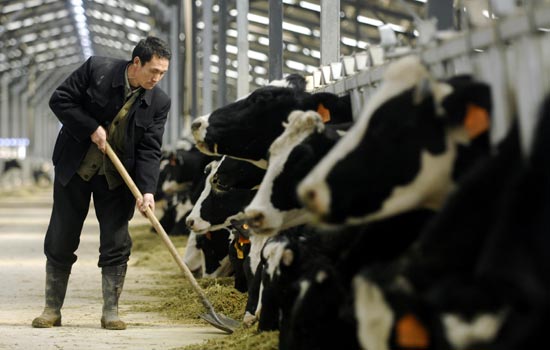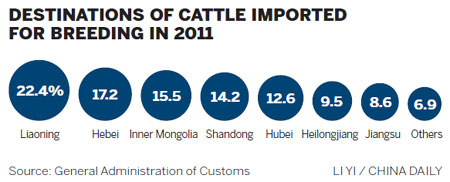
|
 |
|
A worker at a dairy farm in Yinchuan, Ningxia Hui autonomous region. China imported nearly 100,000 cattle for breeding last year, mainly from Australia, New Zealand and Uruguay. [Photo/Xinhua] |
Foreign farm animals help improve breeds of cows and milk quality
The country's massive demand for milk has led to an increase in imports of dairy cattle from Australia, New Zealand and Uruguay, but that trade is expected to slow in five years, according to a leading expert.
China imported nearly 100,000 cattle from the three countries last year.
The number will keep increasing, said Li Shengli, chief scientist of the National Milk Industry Technology System and a professor at China Agricultural University.
Modern Farming Group Co Ltd, Liaoning Huishan Holdings Group and other top milk producers plan to set up dozens of large farms, he said.

Other large dairy companies have built their own farms to ensure that the quality of the milk supply remains high.
China Mengniu Dairy Co Ltd will invest 3.5 billion yuan ($549.15 million) to set up between eight and 12 dairies by 2015.
Bright Dairy and Food Co Ltd is expected to build a 130-million-yuan farm in Wuhan, Hubei province. And Inner Mongolia Yili Industrial Group Co Ltd last month opened a 220-million-yuan farm that is home to 5,000 dairy cattle.
Nestle (China) Ltd, meanwhile, set up a dairy-farming institute at its Shuangcheng fresh milk supply base in Heilongjiang province early this month. The institute operates three training farms, which work with 10,720 cows.
Not surprisingly, large farms need more cattle than small ones. Since 2009, China has been buying more of the farm animals than any other country in the world.
Last year, 52 percent of the cattle imported by the country came from Australia, 34 percent from New Zealand and 14 percent from Uruguay, according to the General Administration of Customs.
Foreign animals now make up a small proportion of the country's 14 million heads of cattle. In the future, though, it is expected that higher-yielding foreign species will help make the dairy industry more productive, professor Li said.
Li said the great demand for foreign cattle is likely to last for about five years, after which Chinese farms will have the capacity to have the overseas breeds reproduce on a large scale.
He said technology will allow farmers to ensure that the first-born calves of their overseas cows will be female, allowing them to accelerate the animals' reproduction.
Gao Lina, president of Modern Farming Group, said a faster rate of reproduction will lead the company to cease importing cattle on a large scale by the end of this year. Imported cattle have so far been used primarily as a means of producing higher quality cows.
"China does not have a shortage of cows," Gao said. "It is in need of cows that are good, a quality that is not reflected in their numbers but in their yields."
Modern Farming Group has about 150,000 cattle, most of which are imported. About 60 of them came from Australia and the rest from New Zealand and Uruguay.
Cattle inventories and milk cows' yields in China have been on the rise. Last year, the country was home to 14.4 million cattle, up 17 percent from 2008. Those animals produced 38.1 million metric tons of milk, up 0.8 percent from the same year, according to the Ministry of Agriculture.
Restricted by its resources and by environmental conditions, the industry can no longer increase its productivity merely by acquiring more cattle, Gao Hongbin, vice-minister of agriculture, said at the third dairy convention held in Zhengzhou, Henan province, on Monday.
Technological innovation is the best way to keep the quality of dairy products high, he said.
wangzhuoqiong@chinadaily.com.cn


 Washington to remain focused on Asia-Pacific
Washington to remain focused on Asia-Pacific RQFII target blue chips amid bear market
RQFII target blue chips amid bear market Australian recall for top two exporters
Australian recall for top two exporters China fears new car restrictions
China fears new car restrictions